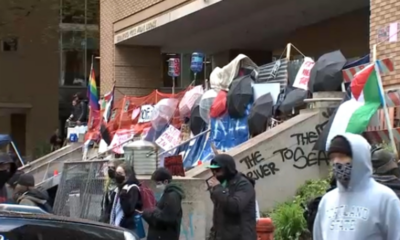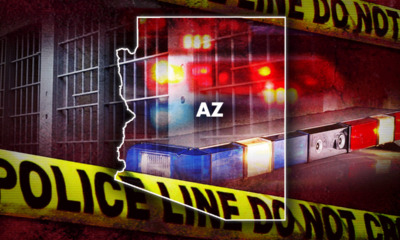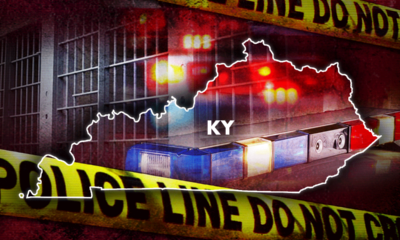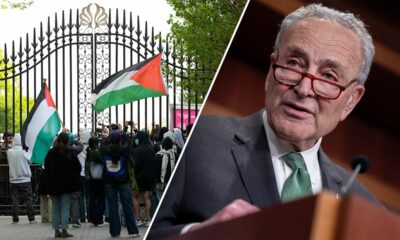News
See Maps of Where Eclipse Seekers Flocked and the Traffic That Followed

Note: The map shows change in movement activity on Monday, compared with an average of the movement activity on the previous four Mondays.
Source: Mapbox (movement data)
Monday’s solar eclipse drew huge crowds to the path of totality, temporarily ballooning the populations of small towns and rural areas across the country. The map above shows an estimate of where human activity increased the most on Monday, compared with that on an average Monday, according to data from Mapbox, an online mapping company.
Some towns in the path of totality expected their populations to double, and the data — drawn from mobile-device activity — showed such increases in many places.
Among the towns with more than 100 percent increases in activity were St. Johnsbury, Vt.; Lancaster, N.H.; and Ste. Geneviève, Mo. State parks like the Adirondack Park in New York and many areas in the Ozarks region of Arkansas and Missouri were also popular destinations. The data includes activity for the entire day and also shows a pattern of movement away from the path of totality, as seen in the darker areas on the edges of the path in the map above.
Around midafternoon Monday came the main event: the moment of totality, when the moon moved fully in front of the sun, turning daylight to darkness. That climax lasted only a few minutes, and then eclipse watchers started their trips home or to hotels.
Traffic was stopped or delayed along some highways more than eight hours later, according to data from TomTom, a mapping and navigation company. Officials in many parts of the country had warned of snarled traffic, and roads in the Northeast — from New York to Maine — had the greatest concentration of hourslong delays.
Interstate 87 in New York had a line of traffic more than 55 miles long around 6 p.m., and cars were still backed up for miles at 11 p.m. on Interstate 93 in New Hampshire, more than seven hours after the eclipse, according to TomTom.
On a normal weekday afternoon, the 210-mile drive from Burlington, Vt., to Somerville, Mass., takes about three and a half hours. On Monday, the same trip took Liam Sullivan, 26, of Somerville, more than nine hours after watching the eclipse.
“The worst part was that in the first four hours we only went about 40 miles,” Mr. Sullivan said. “A solid marathoner is beating our pace there. It was completely hopeless congestion the entire time.”
Eclipse watchers in Burlington, Vt., at Lake Champlain.
Cassandra Klos for The New York Times
Interstate 93 in New Hampshire many hours after the eclipse. Nick Perry/Associated Press
While drivers in the Northeast faced the worst of the delays, there were also long traffic jams outside of Indianapolis, St. Louis and Columbus, Ohio.
Traffic delays at 9 p.m. Eastern time
“It was definitely the worst traffic I’ve ever seen in my life,” said Richard Chen, who spent nine hours driving from Newport, Vt. to his home in Brooklyn, N.Y., after the eclipse.
Despite the traffic, Mr. Chen said he didn’t see any road rage. “I think people were just kind of thrilled to witness the eclipse, and the traffic and road tripping was just part of the experience,” he said.
Was the drive worth it? For Mr. Chen, there was no question. “Definitely,” he said, noting that the next major U.S. eclipse will take place in 2045.
Mr. Sullivan wasn’t so sure. He said that the eclipse was stunning and that he was grateful to witness it but added: “If you told me yesterday how long it would take, I would have gone back to bed.”

News
Police enter UCLA anti-war encampment; Arizona repeals Civil War-era abortion ban

Good morning. You’re reading the Up First newsletter. Subscribe here to get it delivered to your inbox, and listen to the Up First podcast for all the news you need to start your day.
Today’s top stories
Law enforcement officers are moving into a pro-Palestinian encampment at UCLA. Violence erupted this week on UCLA’s campus when counter-protesters attempted to forcibly dismantle the tents. Journalists and protest organizers say fireworks and tear gas were used. The confrontation was a flashpoint among dozens of university protests against the war in Gaza that have broken out nationwide.
Counterprotesters try to dismantle a pro-Palestinian encampment set up on the University of California, Los Angeles campus in the early hours of Wednesday.
Etienne Laurent/AFP via Getty Images
hide caption
toggle caption
Etienne Laurent/AFP via Getty Images

Counterprotesters try to dismantle a pro-Palestinian encampment set up on the University of California, Los Angeles campus in the early hours of Wednesday.
Etienne Laurent/AFP via Getty Images
- The nationwide protests began at Columbia University, where police cleared out an encampment and occupied campus building Tuesday night. On Up First, NPR’s Martin Kaste compares the police response to 1968 when Columbia students protested the Vietnam War. Kaste talked about some of these differences with Chuck Wexler, who runs the Police Executive Research Forum. Wexler thinks that in most cases, protesters are getting more careful treatment by the police. Still, injuries have been reported, and police trainer Russ Hicks says he’s seen some officers lose their cool.
- The U.S. House of Representatives voted to pass an antisemitism bill Wednesday with bipartisan support. The measure would adopt the International Holocaust Remembrance Alliance’s definition of antisemitism for use in the enforcement of federal anti-discrimination laws in education programs. Some Democrats voiced concerns, however, that the international group’s definition could be broad enough to include protected free speech.
Arizona lawmakers have voted to repeal a Civil War-era abortion ban. Democratic Governor Katie Hobbs is expected to sign the bill into law today. But it won’t go into effect until 90 days after the state’s legislative session — meaning the near-total abortion ban could temporarily go into effect before the repeal takes it off the books.
- “This has really revealed a schism in the Republican party,” says Ben Giles of NPR network station KJZZ in Phoenix, Ariz. Party leaders like Donald Trump have called on Republicans to fix or repeal the law. But Giles says rank-and-file Republicans in the state, like Sen. Jake Hoffman, who leads the local version of the Freedom Caucus, say the law was great.
- As abortion continues to be a key issue heading into the 2024 presidential election, a new poll shows voters are more divided by party on the issue than ever before.
Donald Trump yesterday held his first campaign rallies since the start of his criminal hush money trial in New York. In lengthy speeches in Waukesha, Wisc., and Freeland, Mich., Trump focused on what a second term would look like and the consequences if he doesn’t win.
- With his limited campaign schedule, NPR’s Danielle Kurtzleben says Trump is focusing on the new “Protect the Vote” program his campaign and the RNC recently rolled out. The program aims to get a “massive force of people” to watch poll workers and make sure ballots are counted correctly. Kurtzleben says the “renewed, early, organized sustained” push for this program doubles down on “the Big Lie” that Trump and the Republican party have been telling about who won the 2020 election.
How to thrive as you age

A man is walking up the steps of an underground passage
lingqi xie/Getty Images
hide caption
toggle caption
lingqi xie/Getty Images

A man is walking up the steps of an underground passage
lingqi xie/Getty Images
How to Thrive as You Age is a special series from NPR’s Allison Aubrey about the secrets and science of longevity.
Are you an elevator person or a stairs person? Your choice could help you live longer. A new meta-analysis presented at a European Society of Cardiology conference found that people in the habit of climbing stairs had about a 39% lower likelihood of death from heart disease, compared to those who didn’t climb stairs. They also had a lower risk of heart attacks and strokes.
- How many stairs are enough? One study found climbing six to ten flights a day was linked to a reduced risk of premature death. Another found climbing more than five flights a day lowered the risk of cardiovascular disease by 20%.
- The benefits can kick in quickly. One study found that four to eight weeks is all you need to start seeing an improvement in your life.
- But if you’re not a regular stair climber, researchers say you should start slowly.
Picture show

Aviva Siegel, who was held hostage in Gaza for 51 days, and whose husband Keith remains in Hamas captivity, spends time with her eight-year-old granddaughter Yali Tiv at her daughter’s home on Kibbutz Gazit on March 26. Aviva has been staying with her daughter in northern Israel since being released in November.
Tamir Kalifa/Tamir Kalifa for NPR
hide caption
toggle caption
Tamir Kalifa/Tamir Kalifa for NPR

Aviva Siegel, who was held hostage in Gaza for 51 days, and whose husband Keith remains in Hamas captivity, spends time with her eight-year-old granddaughter Yali Tiv at her daughter’s home on Kibbutz Gazit on March 26. Aviva has been staying with her daughter in northern Israel since being released in November.
Tamir Kalifa/Tamir Kalifa for NPR
Aviva Siegel, 63, was taken hostage by Hamas militants on Oct. 7, along with her husband Keith. She was released after 51 days, but he was not. Recently, Hamas released a video showing Keith alive.
See photos of Aviva and her family since her release, and read about how life has changed for them as they wait with hope for Keith’s return.
Check out npr.org/mideastupdates for more coverage and analysis of the conflict.
3 things to know before you go

Angie Cox, left, and Joelle Henneman hug after an approval vote at the United Methodist Church General Conference that repealed their church’s longstanding ban on LGBTQ clergy and same-sex weddings.
Chris Carlson/AP
hide caption
toggle caption
Chris Carlson/AP

Angie Cox, left, and Joelle Henneman hug after an approval vote at the United Methodist Church General Conference that repealed their church’s longstanding ban on LGBTQ clergy and same-sex weddings.
Chris Carlson/AP
- The United Methodist Church, one of the largest Protestant denominations in the U.S., has voted to repeal its ban on LGBTQ+ clergy and the prohibition on its ministers from officiating at same-sex weddings.
- Scientists say the bird flu spreading among dairy cattle poses a low risk to humans. But federal health officials say they’ve started trying to develop a vaccine, just in case.
- If you’re an adventurous eater, you may want to take advantage of the two broods of cicadas that are about to emerge from the ground. Chef Joseph Yoon shares some delectable ways to cook the bugs.
This newsletter was edited by Majd Al-Waheidi and Obed Manuel.
News
Standard Chartered beats profit forecasts on back of higher interest rates
Standard Digital
Weekend Print + Standard Digital
Complete digital access to quality FT journalism with expert analysis from industry leaders. Pay a year upfront and save 20%.
News
Trump faces prospect of additional sanctions in hush money trial as key witness resumes testimony
NEW YORK (AP) — Donald Trump faces the prospect of additional sanctions in his hush money trial as he returns to court Thursday for another contempt hearing followed by testimony from a lawyer who represented two women who have said they had sexual encounters with the former president.
The testimony from attorney Keith Davidson is seen as a vital building block for the prosecution’s case that Trump and his allies schemed to bury unflattering stories in the run-up to the 2016 presidential election. He is one of multiple key players expected to be called to the stand in advance of prosecutors’ star witness, Michael Cohen, Trump’s former lawyer and personal fixer.
What to know about Trump’s hush money trial:
Prosecutors are seeking $1,000 fines for each of four comments by Trump that they say violated a judge’s gag order barring him from attacking witnesses, jurors and others closely connected to the case. Such a penalty would be on top of a $9,000 fine that Judge Juan M. Merchan imposed on Tuesday related to nine separate gag order violations that he found.
It was not immediately clear when Merchan might rule on the request for fresh sanctions, but the prospect of further punishment underscores the challenges Trump the presidential candidate is facing in adjusting to the role of criminal defendant subject to rigid courtroom protocol that he does not control. It also remains to be seen whether any rebuke from the court will lead Trump to adjust his behavior given the campaign trail benefit he believes he derives from painting the case as politically motivated.
During a one-day break from the trial on Wednesday, Trump kept up his condemnation of the case, though stopped short of comments that might run afoul of the gag order.
“There is no crime,” he told supporters in Waukesha, Wisconsin. “I have a crooked judge, is a totally conflicted judge.”
Former President Donald Trump speaks to the media outside the courtroom of his trial at Manhattan criminal court, Tuesday, April 30, 2024, in New York. (Curtis Means/Pool Photo via AP)
The trial, now in its second week of testimony, has exposed the underbelly of tabloid journalism practices and the protections, for a price, afforded to Trump during his successful run for president in 2016.
The case concerns hush money paid to squelch embarrassing stories, including from a porn actor and a former Playboy model, and reimbursements by Trump that prosecutors say were intentionally fraudulent and designed to conceal the true purpose of the payments and to interfere in the election.
The former publisher of the National Enquirer, David Pecker, testified last week that he offered to be the “eyes and ears” of the Trump campaign and described in detail his role in purchasing a sordid tale from a New York City doorman that was later determined to not be true as well as accusations of an extramarital affair with former Playboy model Karen McDougal.
The goal was to prevent the stories from getting out, a concern that was especially pointed in the aftermath of the disclosure of a 2005 “Access Hollywood” recording in which he was heard describing grabbing women without their permission.
A separate $130,000 payment was made by Cohen, Trump’s former lawyer and personal fixer, to porn actor Stormy Daniels, to prevent her claims of a 2006 sexual encounter with Trump from surfacing.
Trump’s company then reimbursed Cohen and logged the payments to him as legal expenses, prosecutors have said in charging the former president with 34 felony counts of falsifying business records — a charge punishable by up to four years in prison.
Returning to the stand Thursday will be Keith Davidson, a lawyer who represented both Daniels and McDougal in their negotiations with the National Enquirer and Cohen.
He testified that he arranged a meeting at his Los Angeles office during the summer of 2016 to see whether the tabloid’s parent company American Media, Inc. was interested in McDougal’s story. At first, they demurred, saying she “lacked documentary evidence of the interaction,” Davidson testified.
Former President Donald Trump speaks to the media outside the courtroom of his trial at Manhattan criminal court, Tuesday, April 30, 2024, in New York. (Curtis Means/Pool Photo via AP)
But the tabloid at Pecker’s behest eventually bought the rights, and Davidson testified that he understood — and McDougal preferred — it would never be published. One reason for that, he said, is that there was an “unspoken affiliation” between Pecker and Trump and a desire by the company that owned the Enquirer to not publish stories that would hurt Trump.
The morning will begin with another gag order hearing. The four statements at issue were made by Trump before Merchan warned on Tuesday that additional violations could result in jail time.
They include comments to reporters and in interviews assailing Cohen’s integrity.
-

 Education1 week ago
Education1 week agoVideo: Dozens of Yale Students Arrested as Campus Protests Spread
-

 News1 week ago
News1 week agoLarry Webb’s deathbed confession solves 2000 cold case murder of Susan and Natasha Carter, 10, whose remains were found hours after he died
-

 World7 days ago
World7 days agoHaiti Prime Minister Ariel Henry resigns, transitional council takes power
-

 News7 days ago
News7 days agoFirst cargo ship passes through new channel since Baltimore bridge collapse
-

 World1 week ago
World1 week agoUS secretly sent long-range ATACMS weapons to Ukraine
-

 World1 week ago
World1 week agoTurkey’s Erdogan meets Iraq PM for talks on water, security and trade
-

 World1 week ago
World1 week agoSpanish PM Pedro Sanchez suspends public duties to 'reflect'
-

 News1 week ago
News1 week agoAmerican Airlines passenger alleges discrimination over use of first-class restroom

















